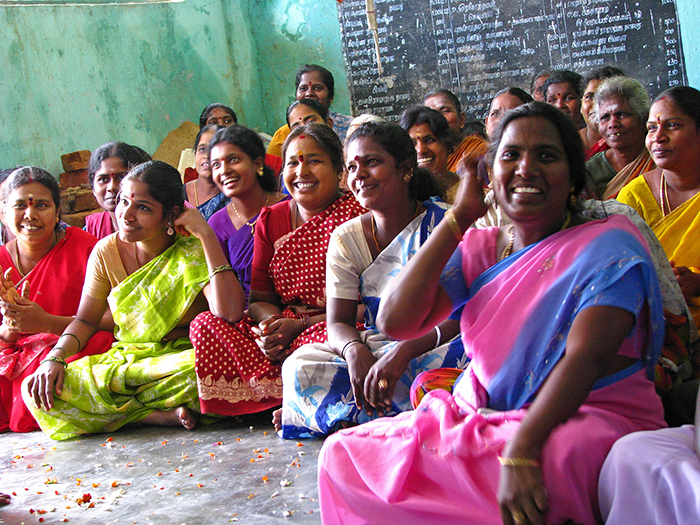For Women in India, Friendship Can Improve Business Success
IPR associate Seema Jayachandran examines peer effects for female entrepreneurs
Get all our news
In the normal course of their lives, [Indian women] aren’t meeting people and having conversations about business with others.”
Seema Jayachandran
Associate professor of economics and an IPR associate

IPR associate Seema Jayachandran examines the effect of peers on female micro-entrepreneurs in India.
No matter where they live, in rich or poor countries, women are less likely to succeed as entrepreneurs. A common policy prescription has been to offer business training. Yet emerging evidence is showing that training alone does not resolve this gender gap.
In a recent IPR working paper, economist and IPR associate Seema Jayachandran and her colleagues focus on female micro-entrepreneurs in India. In particular, they examine if including peer support in training might increase their success as entrepreneurs.

In India, women face difficulty in entering the workforce, in part due to the country’s stifling social restrictions.
“There isn’t a lot of personal autonomy for most women in India,” Jayachandran remarked.
For instance, women in some communities might be stigmatized for leaving the house without a companion—making it difficult to hold a job outside of the home. Women entrepreneurs can work around these social restrictions by opening home-based businesses, from rolling incense sticks to working as tailors, but they probably don’t encounter the same support network as their male peers.
“In the normal course of their lives, [Indian women] aren’t meeting people and having conversations about business with others,” Jayachandran explained.
Working with SEWA Bank, a women’s bank with 170,000 members, the researchers identified 636 female entrepreneurs from a pool of 1,900 eligible members in Ahmedabad. Bank employees invited them to attend a free, two-day business course teaching financial literacy, business skills, and short-term goal-setting. The women in the sample were randomly assigned into one of three groups: a control group, those invited to the training alone, and those who were invited to come with a friend.
Four months after the training, the researchers found the 207 women who trained with a friend were more likely to have taken out a business loan, set more ambitious business goals, and experienced “pretty sizeable increases in their income,” Jayachandran said.
What might explain this effect? Jayachandran and her colleagues offer several explanations: Bringing along a friend could create a more supportive environment, giving women more confidence. Furthermore, attending the training with a friend could offer participants an enduring sense of support in the following months, as well a resource for financial assistance and recalling information.
The results offer important insight into the value of bringing peers into the workplace. “Our friends push us and support us,” Jayachandran concluded. “If you set ambitious goals, they’re the ones who cheer you on.”
Seema Jayachandran is associate professor of economics and an IPR associate. For more information, read the IPR working paper, “Friendship at Work: Can Peer Effects Catalyze Female Entrepreneurship?” (IPR-WP-15-22).
Top photo: Wikimedia Commons
Published: February 25, 2016.